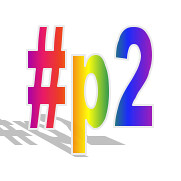#mooreandme and #p2: learnings for progressives on Twitter (REVISED DRAFT)
Draft, work in progress. Feedback welcome!
Last updated February 5.

Twitter is an opportunity to engage with communities currently marginalized by the “progressive blogosphereâ€. Demographically and stylisticly, Twitter is far less male-dominated than the big blogs of the progressive blogosphere …
— Tracy Viselli and Jon Pincus, The #p2 Hashtag and Strategies for Progressives on Twitter, February 2009
Twitter is, quite possibly, the best available medium for this particular kind of protest. The format has a number of features that level a playing field that tends to push women into the outfield.
– How #Mooreandme Worked, Lili Loofbourow, December 2010
Twitter was an instinctive choice for #MooreandMe, because it made the target of the protest accessible and ensured that he could hear us. But I liked it as a medium for #DearJohn too, because it was really equalizing, it wasn’t hierarchical, it ensured that voices and perspectives could influence the conversation regardless of how well-connected or well-known they were, and it was a very visible, trackable way to register dissent.
– Sady Doyle of Tiger Beatdown, interviewed in where is your line?, January 2011
 It’s been another tough year for the Bill of Rights in the US. We spent Bill of Rights day on the road, opting out of the TSA’s abuse of our rights by driving (not flying) from San Francisco to Seattle — so apologies for the lateness of this post.
It’s been another tough year for the Bill of Rights in the US. We spent Bill of Rights day on the road, opting out of the TSA’s abuse of our rights by driving (not flying) from San Francisco to Seattle — so apologies for the lateness of this post.


